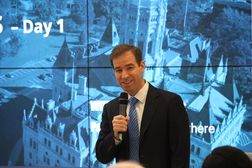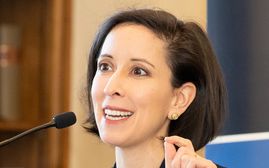
Processing Your Payment
Please do not leave this page until complete. This can take a few moments.
- News
-
Editions
View Digital Editions
Biweekly Issues
- May 13, 2024
- April 29, 2024
- April 15, 2024
- April 1, 2024
- March 18, 2024
- March 4, 2024
- February 19, 2024
- February 5, 2024
- January 22, 2024
- + More
Special Editions
- Lists
- Viewpoints
- HBJ Events
- Business Calendar
- Custom Content
As major IT companies establish Hartford beachheads, political, business leaders see more room for growth
 HBJ PHOTO | MICHAEL PUFFER
Scott Burghoff is the senior vice president of consulting services at CGI, a Montreal-based consulting firm that has opened a new office in downtown Hartford.
HBJ PHOTO | MICHAEL PUFFER
Scott Burghoff is the senior vice president of consulting services at CGI, a Montreal-based consulting firm that has opened a new office in downtown Hartford.
It began in 2018, with the announcement that India-based tech giant Infosys would open a Hartford hub employing 1,000 people by 2023.
Four additional prominent tech companies have since followed, announcing Hartford outposts with large staffs to service regional industries and beyond.
“You have seen a number of global tech and information technology firms choose Hartford as a hub for their East Coast operations and I think it is a reflection of a number of Hartford’s strengths,” Hartford Mayor Luke Bronin said in a recent interview.

Attracted by the presence of the area’s large insurance, healthcare and manufacturing sectors, some of these tech companies have long had a foothold in the region. They’ve opened hubs as a home base, where staff can train, collaborate and interact with existing and potential clients.
Bronin cited Greater Hartford’s “deep” local talent pool, high standard of living and affordability as regional selling points.
“Hartford offers the proximity to New York, Boston and the entire East Coast at a far lower cost of doing business, particularly when it comes to commercial rents,” Bronin said.
City officials worked with the state to line up incentives and recruit Infosys.
“We did that with the hope that other, similar firms would see them planting a flag here, see their success and follow,” Bronin said. “And so far, that’s what’s happened.”
String of tech arrivals
In 2019, New Jersey-based IT services firm GalaxE.Solutions Inc. announced it had taken offices in the Stilts Building, at 20 Church St., to support 25 employees. It later moved to larger quarters (25,000 square feet) in the CityPlace I office tower, and in February announced plans to relocate 180 jobs to Hartford.
Last September, Montreal-based consulting firm CGI opened a new office in the 13-story “Boat Building” at 1 American Row — space that will eventually host 200 staff.
About two months later, India-based IT giant HCL Technologies debuted a “global delivery center” at 10 State House Square, announcing plans to add 500 jobs in Connecticut — 200 in Hartford — within three years. Proximity to major client Stanley Black & Decker was a motivating factor in the expansion, with plans for further growth targeting manufacturing, aerospace, defense, insurance, life sciences and healthcare companies.
In April, Mumbai-based Larsen & Toubro Infotech announced a 13,000-square-foot “engagement center” — also in the Boat Building — with capacity for about 100 staff.
Scott Burghoff, CGI’s senior vice president of consulting services, said the creation of his firm’s Hartford hub allowed the company to plant its flag in an important market.
“I think it was really about raising our profile, not just for the sake of our clients, but as much so for recruiting, to just get our brand out there,” Burghoff said. “For our members, it builds pride in the organization, I think, when there is something physical that they can point to.”
Founded in 1976, CGI has 84,000 consultants and professionals across the globe and reported revenue of $12.1 billion in fiscal 2021.
“Hartford Steam Boiler is our client. Travelers is our client,” Burghoff said. “So, we are literally across Constitution Plaza, literally across the block from them. We are close to the Convention Center. We are right here. Everything is close. We don’t want to miss out on opportunities.”
CGI already had about 150 employees embedded with Hartford-area firms before it decided to lease a roughly 5,000-square-foot office. Now, the multinational company has 175 employees in Hartford and openings for 75 more.
Most of CGI’s Hartford-based staff continues to work remotely or are embedded with clients. The downtown location serves as a sort of mothership, a place with offices for management, group meetings, training and functions. On most days only a handful of employees are physically present.
“Our industry is just booming right now,” Burghoff said. “One of the reasons you’ve seen a lot of our competitors making announcements [to expand in Hartford] is there is a lot of room for IT services these days.”
Twenty-five-year-old Larsen & Toubro Infotech had hundreds of employees embedded with Hartford-area clients before it opened its engagement center, which facilitates staff and customer interactions, bringing services closer to clients, the company said. The office has room for about 100 employees but, given hybrid work schedules, can accommodate 250.
LTI has more than 485 clients and operations in 33 countries, including seven U.S. offices. In Connecticut, it serves the finance, insurance, manufacturing, utilities, life sciences, aerospace and defense industries.
LTI said it currently has about 500 employees in the Hartford area, serving 12 clients. It plans to hire 150 to 200 more in the greater Hartford region in the next year. These will range from “experienced professionals to talented graduates” from local universities, LTI said.
Exist globally, grow locally
Stanley Black & Decker is one of the large companies that has drawn IT firms to the region.

Martin Guay, Stanley Black & Decker’s vice president of business development, said HCL was new to Hartford when it opened an office to serve Stanley and future potential clients in the region.
Today, companies expect a local presence from their IT outsource providers, Guay said.
“I think the expectation was because they are supporting our IT needs, that they would be close to us, that they would have a presence,” Guay said. “A lot of the IT companies are putting in regional hubs in Hartford and other cities to support their customer base.”
In the past, when IT was outsourced, much of the work went to India, Guay said. But there is an increasing recognition of the need for direct, local contact as well.
In an increasingly unstable world, it makes sense to shore up supply lines, even when it comes to talent, he said.
“The world has become a bit unstable, so having your supply chain closer to you is safer and stronger than having it far away,” Guay said. “And labor is part of the supply chain.”
Mark Boxer, executive vice president and chief operating officer of the University of Hartford, is one of the people trying to link local talent with the incoming technology companies.

In Boxer’s prior job as health insurer Cigna Corp.’s global chief information officer, he helped recruit Infosys to Hartford.
Insurers, healthcare organizations and manufacturers are investing more deeply into technology, data, analytics and automation, Boxer said. Among other impacts, it is creating increased demand for IT talent, he said.
“The stars and moons are sort of aligned where you have this demand for technology talent, you have investment flowing into those new areas and then you have these partners that want to cultivate relationships with [Hartford-area] companies,” Boxer said. “So, the stars and moons are sort of aligned for, I think, the Hartford region becoming a technology hub.”
The Computing Technology Industry Association (CompTIA), in March, ranked the metro Hartford area in 19th place on its latest list of the “Top 20 Best Tech Cities for IT Jobs.”
Launched in 2018, the list is based on prior-year, jobs-posting data, cost of living and projected job growth.
Boston dropped off the list this year. New York placed 16th.
The Hartford-metro area tech sector proved resilient to pandemic impacts, according to CompTIA, posting 21,683 open tech jobs in 2021. Nearly half of those were for software developers and engineers; IT project managers; and network engineers and architects, according to CompTIA.
Top employers included Cigna, Travelers, Accenture, Deloitte and CVS Health, according to the association, which also noted Infosys’ stated target of 1,000 hires by 2023.
“As one of the best cities for tech jobs, the Hartford area is a great new addition to the Tech Town Index and one that will surely be on the upswing as innovation continues to prosper in Connecticut,” reads the CompTIA report.
One question that remains is whether Greater Hartford and Connecticut in general can produce enough tech talent to satisfy IT worker demand. When General Electric announced plans in 2016 to move its headquarters to Boston, it cited a need for a larger tech talent pool among the reasons.
However, the world has changed significantly since then, as employers, particularly tech companies, increasingly develop their own training programs and place less emphasis on traditional four-year degrees, particularly for more entry-level positions.
For example, GalaxE.Solutions Inc. said it will hire 60 graduates from the Hartford-based nonprofit Girls for Technology’s service desk training program, which will train young people, particularly Hartford residents between the ages of 18 and 29 who have a high school diploma or GED equivalent.
Infosys has established a training program with Trinity College, traditionally known as a liberal arts school.
Big fish, small state

Peter Denious, CEO AdvanceCT, said his state-funded economic development agency is talking with other tech companies, attempting to attract them to Hartford and beyond. Hartford has a potential to become not only a magnet for IT companies but also insurance technology companies, he said.
In addition to its strategic location, affordability and quality of life, Connecticut offers easier access to top decision-makers when compared to bigger states with larger metro areas, Denious said.
“In a relatively small state, you can stand out and can work with economic development leaders,” Denious said. “Whereas if you go to New York or Boston or some other location, it’s just harder for them. There are more competitors for airtime and attention.”
David Griggs, president and CEO of the MetroHartford Alliance, credited the city’s captains of industry with influencing tech companies to take office spaces. There is utility for both the client and the service company, but there is an element of altruism as well, Griggs said.
“Most of our big employers look at what they spend and where they do and see how it can benefit the community they live in,” Griggs said. “This is economic development being practiced at every level.”
Hartford-region tech job stats
$92,096 – Median IT professional salary in 2021
21,683 – Number of open tech jobs posted in 2021
3.5% — Anticipated growth in IT jobs in the next five years
Source: The Computing Technology Industry Association (CompTIA)

2022 Giving Guide
This special edition informs and connects businesses with nonprofit organizations that are aligned with what they care about. Each nonprofit profile provides a crisp snapshot of the organization’s mission, goals, area of service, giving and volunteer opportunities and board leadership.
Learn more
Subscribe
Hartford Business Journal provides the top coverage of news, trends, data, politics and personalities of the area’s business community. Get the news and information you need from the award-winning writers at HBJ. Don’t miss out - subscribe today.
Subscribe
2024 Book of Lists
Delivering Vital Marketplace Content and Context to Senior Decision Makers Throughout Greater Hartford and the State ... All Year Long!
Read Here-
2022 Giving Guide
This special edition informs and connects businesses with nonprofit organizations that are aligned with what they care about. Each nonprofit profile provides a crisp snapshot of the organization’s mission, goals, area of service, giving and volunteer opportunities and board leadership.
-
Subscribe
Hartford Business Journal provides the top coverage of news, trends, data, politics and personalities of the area’s business community. Get the news and information you need from the award-winning writers at HBJ. Don’t miss out - subscribe today.
-
2024 Book of Lists
Delivering Vital Marketplace Content and Context to Senior Decision Makers Throughout Greater Hartford and the State ... All Year Long!
ABOUT
ADVERTISE
NEW ENGLAND BUSINESS MEDIA SITES
No articles left
Get access now
In order to use this feature, we need some information from you. You can also login or register for a free account.
By clicking submit you are agreeing to our cookie usage and Privacy Policy
Already have an account? Login
Already have an account? Login
Want to create an account? Register
Get access now
In order to use this feature, we need some information from you. You can also login or register for a free account.
By clicking submit you are agreeing to our cookie usage and Privacy Policy
Already have an account? Login
Already have an account? Login
Want to create an account? Register









0 Comments